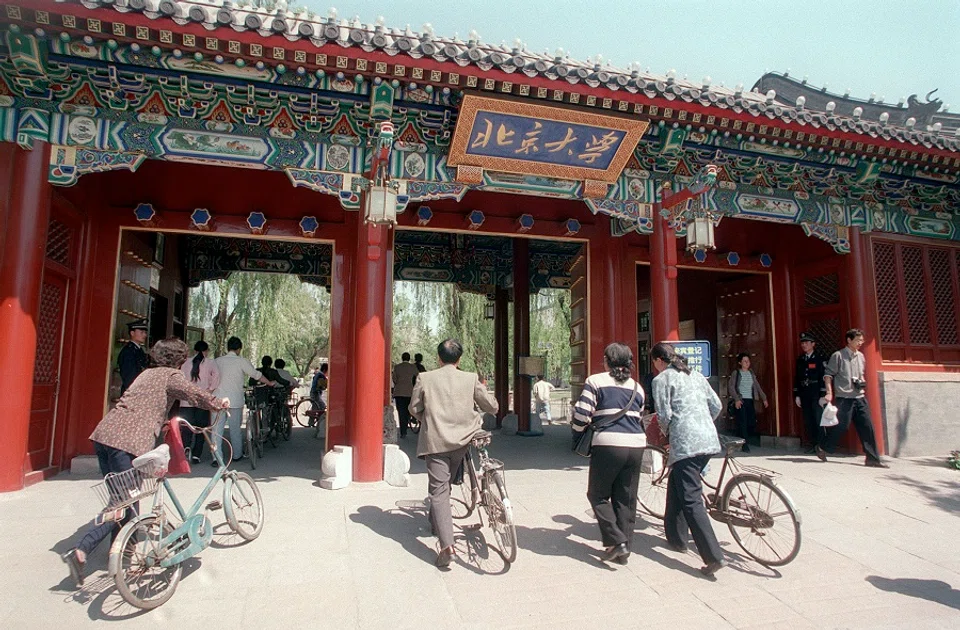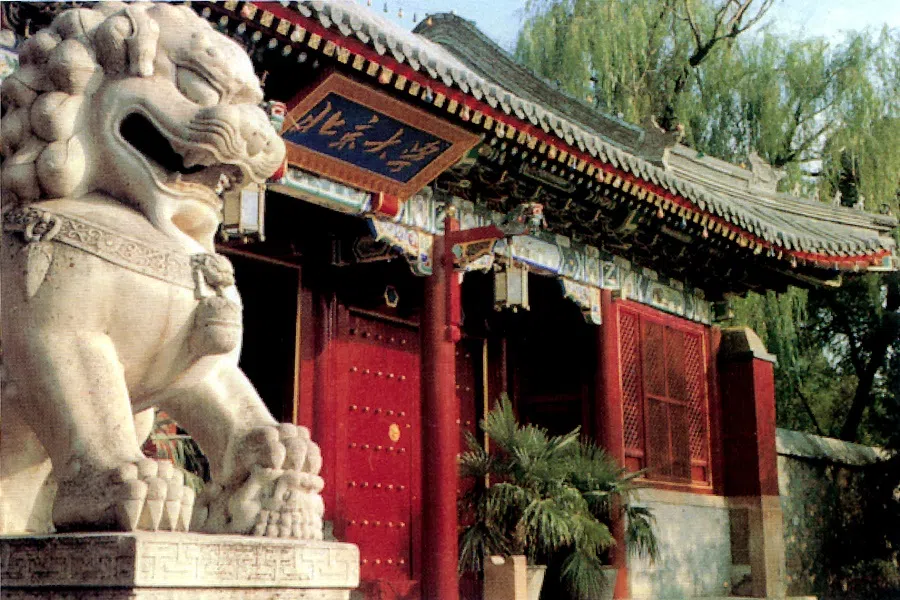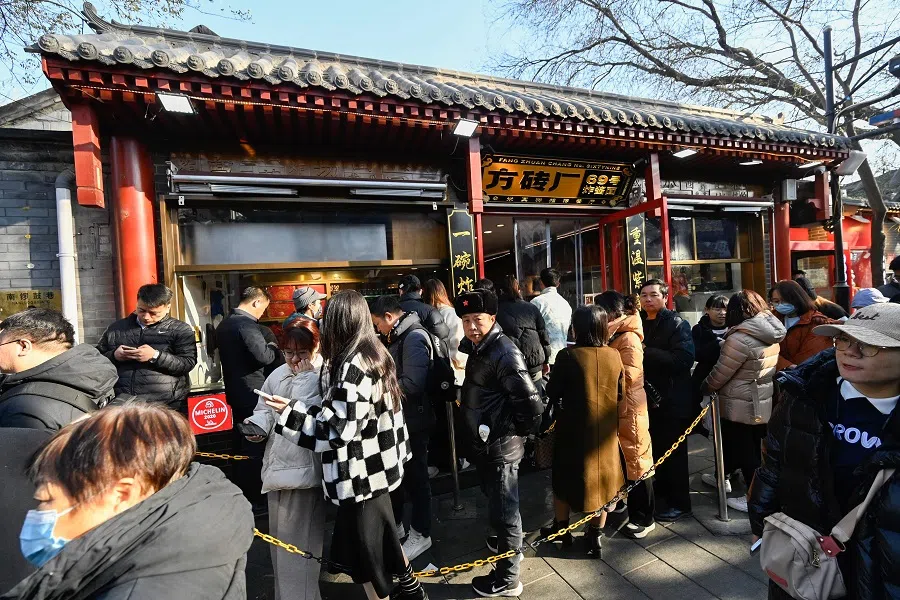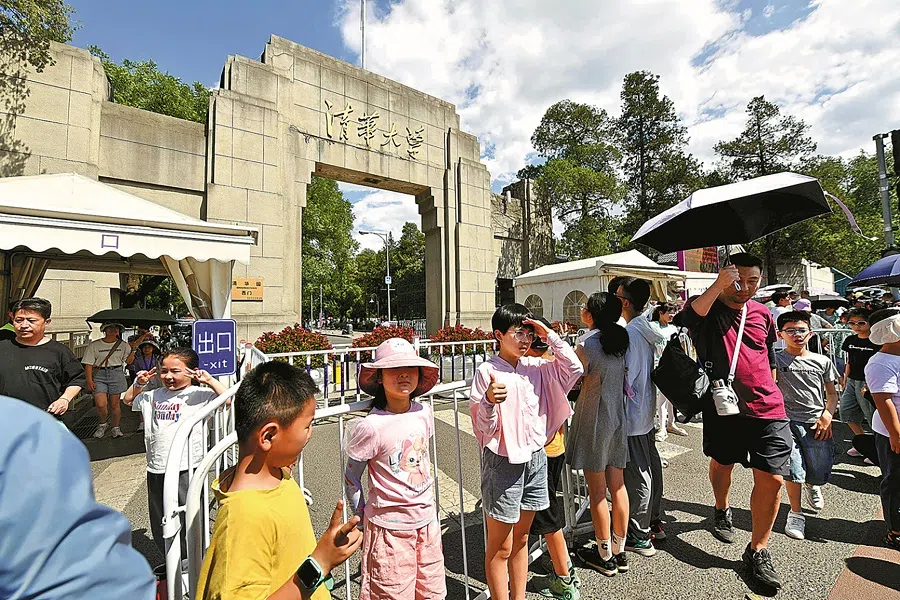A Peking University professor's movement to break down walls
Peking University professor Li Zhi recently made the news for getting chased down by campus security after refusing to submit to facial scans and going over the turnstiles at the university. Lianhe Zaobao's China Desk looks into the professor's call to break down the walls - literal and figurative - around academic grounds.

An associate professor at Peking University (PKU) refused to swipe his card and do a facial recognition scan, bypassing security checks and going over the turnstile to enter the campus, leading to a cat-and-mouse chase with security guards.
Li Zhi, an associate professor of fluid mechanics at PKU's School of Engineering, wrote an article titled "On today's chase with the security guards; high time for PKU's entry policy to be changed" on the Chinese forum website Zhihu in early December, describing the episode with wit and humour.
Troublesome entry policy
In his article, Li claimed that he "has not obeyed this entry policy since 2008."
He wrote that while PKU has been conducting ID checks for campus entry since 2008, he felt that "free movement in and out of a university is a right," and has always refused to submit to a check.
Initially, Li had a few run-ins with the security guards, but over time, the guards came to recognise him and let him in without checks.
In 2019, PKU installed turnstiles at their front gate that required a facial scan to enter, but Li refused to undergo a facial scan or give permission for the use of his facial data.

He would show his work pass, block the facial scanner with his bag before squeezing his lank figure past the turnstiles, or going over the turnstiles to enter the campus. As most security guards recognised Li, they generally did not stop him.
But on 2 December, when Li again went over the turnstiles, the security guards tried stopping him and gave chase. They went all over the campus and were even chasing after Li on bicycles at one time. Li had to pacify the guards by showing them his work pass.
When exiting the campus, Li again insisted on going over the turnstiles. A tug-of-war ensued when a guard intervened and Li had to formally complain to the security department over the policy.
The article gained attention once it was published on 2 December, and was viewed more than 50,000 times on the first day. Two days later, on 4 December, Li penned another article titled "More on why PKU's entry policy needs to be changed", describing the inconvenience of the school's access system.
"This tightly guarded model doesn't apply to universities." Li Zhi
Li wrote that while turnstiles and facial scanners are powerful technologies, the two machines do not work well together. There is frequently a long line at the turnstiles during peak hours since the scanners frequently read incorrectly, especially in the dark. No one likes the entry system, and even the guards on duty are having a tough time.

Li said, "This tightly guarded model doesn't apply to universities. We hope security can be more focused on the public spaces inside the campus, and not at the gates."
He even called on staff and students of PKU to refuse the use of facial scans as a means of identification to move in and out of the campus, stating that "this is a right given to us by the law."
The article ended with a poem: "Zhi loves Yanyuan (another name for PKU), how can the turnstiles obstruct/ Zhi enters Yanyuan, why need a facial scan?" (植也爱燕园,闸机岂可拦/植也入燕园,何须脸授权?)
Chinese netizens found both articles entertaining and were conjuring up images of Li's "battles of brawn and brain" with the security guards.
Li later sent both articles to the school's security department and made a proposal: scanning of cards to enter the school, removing exit turnstiles to allow unrestricted exits, and demolishing the walls surrounding the PKU gates.
"Tertiary institutions should open up not only the school gates, but also the gates to free thought." - Netizens
Universities and openness
Many netizens believed that universities should be kept open to the public as they are public resources and shouldn't be closed.
Other netizens advocated that the openness of the university is not only a physical form of openness, but also a symbol of the university's open and tolerant attitude towards different ideas and groups. "Tertiary institutions should open up not only the school gates, but also the gates to free thought."

Still, other netizens criticised China's tertiary institutions for adopting a "blanket approach" of lockdown following the pandemic, saying that such measures ought to be transitory at most and go against the open-access spirit of universities.
But there were also concerns that once campuses were entirely open, security issues would follow. Netizens said it would be fine if everyone had decent morals, but that might not be the case. "We often saw news of perverts sneaking into schools. University campuses should not be a place where shady characters can enter freely..."
However, some netizens also asked if campus security issues could only be resolved by shutting the gates as there are also many other public areas with free access, such as malls, neighbourhoods, parks and so on - is safety and security in these areas compromised?
Some netizens suggested that access control should be shifted to academic buildings and key installations, with focused management, rather than a blanket approach of shutting the gates to the campus.
Walls erected by universities, physical and otherwise
In fact, for a long time, tertiary institutions in China did not restrict outsiders from visiting their campuses, and people were even able to sit in on classes.

In 2007, Xinmin Weekly carried an article on sitting in for classes or academic auditing at PKU; some people sat in for lessons at PKU for 11 years, while some company big shots came in their Audis to audit MBA lessons costing upwards of 100,000 RMB (US$14,097). "Anyone from anywhere becomes a student once they enter the school gates and sit in the classroom."
When interviewed, one such student said: "Almost all the classes at PKU are open to everyone. Generally, you can check each department's class schedule, and even if lecturers see an unfamiliar face, they wouldn't ask who you are."
As the prestige of PKU, Tsinghua University, and other leading universities grew, so did the number of visitors to these sacred academic grounds; in fact, they became popular destinations for tour groups. However, the huge influx of visitors put a strain on school resources and caused damage to the surrounding area, in addition to other problems such as disruptions to the learning environment.
In 2006, PKU and other tertiary institutions implemented a reservation system, limiting the number of outsiders entering the campus. In 2019, tertiary institutions refused entry to outsiders due to the pandemic. It became impossible for outsiders to sit in on classes, and access to the campuses became a challenge for non-alumni and non-students alike.
...some PKU alumni registered 139 members of the public to visit the school in the name of "study tours". The alumni then charged 10,800 RMB per person from these 139 visitors, earning a profit of 1.5 million RMB in the process.
From July 2023, PKU, Tsinghua and Nanjing University, among other universities, began to open up their campuses, restarting the reservation system for campus visits that had been suspended for nearly four years. But strict security regulations remained for the main gates, and even for school students, entry and exit from the gates required facial scans and scanning of identification cards.
Moreover, the number of reservation slots open for visits to the universities was not enough to meet the huge demand, with tickets for visits to Tsinghua, PKU and other schools gone in an instant; these free tickets were sold by scalpers, with roaring demand spurring "business opportunities" for paid entry into the campuses.

On 24 July, PKU revealed that some PKU alumni registered 139 members of the public to visit the school in the name of "study tours". The alumni then charged 10,800 RMB per person from these 139 visitors, earning a profit of 1.5 million RMB in the process. So even with turnstiles and security guards, money and connections could get these people into PKU.
All-embracing inclusivity?
Li Zhi's actions were possibly against the "blanket approach" that restricted the openness of the university.
When netizens criticised Li for not raising the issue with the leaders and bullying the security guards, Li detailed in a post on 5 December that he had offended several PKU presidents, directors, and deans, and stressed that he was not afraid of offending the PKU leaders. "In PKU, there is no such thing as offending the leaders! It's not that I am fearless, but this is simply a PKU tradition. In earlier years, was anyone afraid of (PKU leaders) Cai Yuanpei and Hu Shih? This is the PKU tradition of all-embracing inclusivity, and those who think I only bully the weak and fear the strong should reflect deeply on this notion. Only when no one is afraid of offending the leaders - that is the realisation of the true China dream!"
Those netizens who proposed that China's tertiary institutions should not only open up these physical gates, but also open up the gates to free thought, unfortunately saw how in 2011, PKU announced that it would conduct checks on "key students" with radical thoughts. Many university teachers in China in recent years were also reported by students to have spoken inappropriately during lectures, and were suspended, transferred, or even fired. In fact, it is the non-physical walls that limit thought, constrict the academic environment and stifle innovation that are the real challenges Chinese tertiary institutions need to face.
This article was first published in Lianhe Zaobao as "北大"跨栏"教授的拆墙行动".



![[Video] George Yeo: America’s deep pain — and why China won’t colonise](https://cassette.sphdigital.com.sg/image/thinkchina/15083e45d96c12390bdea6af2daf19fd9fcd875aa44a0f92796f34e3dad561cc)
![[Big read] When the Arctic opens, what happens to Singapore?](https://cassette.sphdigital.com.sg/image/thinkchina/da65edebca34645c711c55e83e9877109b3c53847ebb1305573974651df1d13a)
